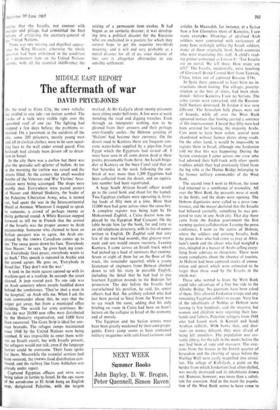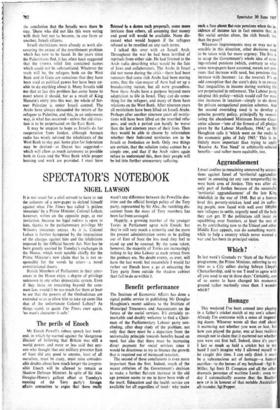The aftermath of war
MIDDLE EAST REPORT DAVID PRYCE-JONES
On the road to Gaza City, the UNEF vehicles lay strafed to one side—an instant symbol. The tracks of a tank were visible right over the squashed roof of one car. The fighting had stopped a few days before; the problems re- mained. On a pavement in the outskirts of the city, some 200 prisoners, mostly young men and all in civilian clothes, were to be seen squat- ting face to the wall under armed guard. Five busloads had already been driven off to deten- tion in Israel.
In the city there was a curfew but there was also the sporadic soft splatter of bullets. At ten in the morning the curfew was raised and the streets filled. At the corners the small wooden booths of the Veterans and War Victims' Asso- ciation were being scavenged. The shops were mostly shut. Everywhere were pasted posters of Nasser and Ahmed Shukeiry, the leader of the Palestine Liberation Army, who, it turned nut, had spent the war in the Intercontinental' Hotel at Amman. Whenever I stopped to speak to someone, a crowd of perhaps twenty or• thirty gathered round.- A White Russian stepped forward to tell me in French that the arrival, of the Israelis was the proper answer to Arab dictatorship. Someone who claimed to have an Italian passport was to agree. An Arab em- ployed by the UNRWA Canadians comes up to me. The sweat pours down his face. 'Everybody likes Nasser,' he says, 'he gives back my coun- try. Everybody likes peace, everybody wants to go back.' This speech is repeated in Arabic and the crowd agrees. He goes on, 'Everybody in Israel liar. They don't win the war.'
A tank in the main square opened up with its machine-gun at a rooftop. In seconds the street cleared. A jeep roared past. To one side was an Arab cemetery where people huddled down behind the tombstones. 'They've shot a man in the hospital,' an Arab tells me. When I ask the tank commander about this, he says that the sniper got away, but from a municipal office building. The search for arms continues. Be- fore the war 20,000 new rifles were distributed by the Shukeiry organisation, and 3,000 have been recovered. The Gaza Strip is ideal for one- man bravado. The refugee camps maintained since 1948" by the United Nations were being combed. It was impossible to enter them with- out an Israeli escort, but with Israelis present, the refugees would not talk, even if the language barrier could be overcome. Their faces spoke for them. Meanwhile the essential services had been restored, the UNRWA food distribution con- tinued, and the railway line from Ashkelon was already under repair.
Captured Egyptian officers and NCOS were being taken in lorries to Israel. In the ops room of the aerodrome at El Arish hung in English map, designated Palestine, with the targets
marked. At Bir Gafgafa about twenty prisoners were sitting under bell-tents. A few were at work mending the road and digging trenches. Even through an interpreter nothing was to be gleaned from their answers and their perhaps over-friendly smiles—the Hebrew greeting of 'Shalom' had become their currency. On the desert road to Kantara there are frequent con- crete water-holes supplied by a pipe-line from Egypt which the Egyptians had turned off. I must have seen in all some dozen dead at these points, presumably from thirst. An Israeli briga- dier at Kantara on the Suez Canal said that on that Saturday in the week following the out- break of war, more than 1,200 Egyptians had been collected from the desert, and an equiva- lent number had been repatriated.
A huge. South African Israeli officer would go to the canal bank and shout for the launch. Two Egyptian civilians were operating it, ferry- ing loads of fifty men at a time. More than 11,000 men had gone across since the cease-fire. A complete register was being kept by Dr Mohammed Zaghlul, a Cairo doctor now em- ployed by the Egyptian Red Crescent. On the table beside him lay the book, fat and tatty as an old telephone directory, with its list of names written in English. Dr Zaghlul said that very few of the men had wounds, that glucose treat- ment and rest would ensure recovery. Leaving Kantara, I came across an Israeli truck which had picked up a load of survivors that evening. Seven or eight of them lay on the floor of the truck, the remainder squatted, while a young lieutenant of engineers from Helwan climbed down to tell his story in passable English, including the detail that he had had to pay fourteen Egyptian pounds to the Bedouin for protection. The day before the Israelis had overwhelmed his position, he said, his senior officers had fled. An artillery colonel who had just been posted to Sinai from the Yemen was to say much the same, adding that his only briefing en route in Cairo had been an hour's lecture on the collapse in Israel of the economy and of morale.
The Egyptian and the Syrian armies must have been greatly weakened by their own propa- ganda. Every camp seems to have contained military magazines with anti-Israel cartoons and articles. In Maasadeh, for instance, at a Syrian base a few kilometres short of Kuneitra, I saw many examples. Drawings of idealised Arab soldiers were contrasted with caricatures of puny Jews strikingly unlike thr Israeli soldiers, many of them originally from Arab countries who were translating this stuff. A child's read- ing primer contained as Lesson 8: 'Ten Israelis
are on patrol. We kill three. How many are left?' The Israelis. incidentally, were lunching off Greatwell Brand Corned Beef from Tientsin, China, taken out of captured Russian T54s.
In Syria there appeared to have been no in- structions about looting. The villages, poverty- stricken at the best of times. had been aban- doned—before Kuneitra I saw no Syrians. The army camps were ransacked, and the Russian- built bunkers destroyed. In Jordan it was very different. The Jerusalem holy places were out of bounds, while all over the West Bank appeared notices that looting carried a sentence of life imprisonment. I heard that fifty men had been arrested for looting, the majority Arabs. Cars seem to have been stolen; several were abandoned without licence plates along roads. On the other hand, it would be impossible to register them in Israel, although one Jordanian told me that this was happening. During the Syrian campaign I came across one crew who had adorned their half-track with silver sports trophies which they had previously lifted from the big villa at the Damia Bridge belonging to the former military commander of the West Bank.
The second time I went to Hebron, the town had returned to a semblance of normality. All over the West Bank the peasants were at work in the fields, and the shops were opening. The Hebron dignitaries were called to a press con- ference, and the mayor declared that the Israelis had behaved correctly, something he was pre- pared to state in any Arab city. That day there came from the Jordan government the first warning against collaboration. Leaving the press conference, I went to the centre of Hebron, where the soldiers and arriving Israelis, both the pious Jews who had come to pray at Abra- ham's tomb and the clever who had wangled a pass, mingled in a bazaar of Arabs selling every- thing from ashtrays to sheepskins. There were many complaints about the absence of tourists. At Hebron had been captured stocks of ammu- nition and petrol which were estimated to be larger than those used by the Israelis in the whole war.
Those who wanted to leave the West Bank could take advantage of a free bus ride to the Allenby Bridge. No questions have been asked of them. This allowed Jordanian troops and any remaining Egyptian soldiers to escape. Very few of the inhabitants of Nablus or Hebron were leaving (a few hundreds, said the mayors), but women and children were rejoining their hus- bands and fathers, Palestine refugees from 1948 who had found work in Kuwait and Saudi Arabian oilfields. With banks shut, and deci- sions on money delayed, they were afraid of being left penniless. The population was cer- tainly jittery, for the talk in the weeks before the war had been of rape and massacre. The evic- tions from the houses in the Jewish quarter of Jerusalem and the clearing of space before the Wailing Wall were easily magnified into atroci- ties. The village of Kalkilyah, a point on the border from which Jordanians had often shelled, was mostly destroyed and its inhabitants driven out. Rumour, however, was more than a substi- tute for coercion. And in the main the popula- tion of the West Bank seems to have come to the conclusion that the Israelis were there 10 stay. 'Mose who did not like this were voting with their feet not to become, in one form or another, Israeli citizens.
Israeli statisticians were already at work dis- covering the extent of the resettlement problem which has now to be faced. In the years since the Palestinians fled, it has often been suggested that the UNRWA relief lists contained names which could not be substantiated. Whatever the truth will be, the refugees both on the West Bank and in Gaza are conscious that they have been used as political pawns but have been un- able to do anything about it. Many Israelis told me that at last this problem has come home to roost where it should, for as a result of King Hussein's entry into this war, the whole of for- mer Palestine is under Israeli control. The Arabs have always demanded the return of the refugees to Palestine, and this, in an unforeseen way, is what has occurred—unless the old situa- tion is to be perpetuated on the East Bank.
It may be utopian to hope as Israelis do for cooperation from Jordan, although Amman radio has wisely advised the inhabitants of the West Bank to stay put. Some plan for federation may be devised—as Dayan has suggested— which will allow as much autonomy as possible both in Gaza and the West Bank while proper housing and work are provided. I must have
listened to a dozen such proposals, some more intricate than others, all assuming that money and good will would be available. None dis- cussed what would happen if the refugees refused to be resettled on any such terms.
I talked this over with an Israeli Arab. Throughout the war he had been terrified of reprisals from either side. He had listened to the Arab radio describing what would be the fate of Jews and collaborators. The Arabs in Israel did not move during the crisis—there had been rumours that some rich Arabs had been storing arms, that the vice-mayor of Acre had set up a broadcasting station, but all were groundless. Now these Arabs have a purpose beyond mere adaptation to life in Israel. They can do some- thing for the refugees, and many of them have relations on the West Bank. After nineteen years all restrictions have been lifted on Israeli Arabs. Perhaps after another nineteen years all restric- tions will have been lifted on the resettled refu- gees, and such a period can hardly be worse than the last nineteen years of their lives. Then they would be able to choose by referendum whether their federated territories are to be Israeli or Jordanian or both. Only two things are certain, that the solution today cannot be a simple one, and that if the Arab rulers again refuse to understand this, then their people will be led into further unnecessary suffering.











































 Previous page
Previous page